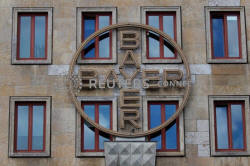Bayer could benefit from home advantage in St. Louis Roundup cancer
trial: experts
 Send a link to a friend
Send a link to a friend
 [July 22, 2019] By
Tina Bellon [July 22, 2019] By
Tina Bellon
ST. LOUIS (Reuters) - Bayer AG <BAYGn.DE>,
facing an upcoming trial in St. Louis over allegations that its Roundup
weed killer causes cancer, has recruited Missouri-based expert witnesses
to make its case in a place where it has century-old roots but where
juries often hit companies with huge damages.
Four expert witnesses Bayer is seeking to admit hail from Missouri
universities, and some legal experts said the company is trying to
clinch its first favorable Roundup verdict by emphasizing its reputation
as a major local employer.
Bayer on Tuesday announced it would create an additional 500
"high-paying" jobs in the St. Louis area. The Bayer unit that makes the
glyphosate-based herbicide, the former Monsanto Co, was founded in St.
Louis in 1901. Monsanto employed 5,400 full-time employees in the St.
Louis area as of May 2018, according to company statements.

The trial in St. Louis County Circuit Court, expected to begin on Aug.
19, was brought by Illinois resident Sharlean Gordon, who says she was
diagnosed with non-Hodgkin's lymphoma after using Roundup for around 14
years at her home. It is the fourth trial over Roundup and the first one
outside of California, where three juries hit Bayer with verdicts as
large as $2 billion. Bayer is appealing those verdicts.
Bayer denies glyphosate or Roundup cause cancer, saying decades of
studies have shown glyphosate to be safe. The company said it looked
forward to presenting the scientific evidence to juries. It said the
experts in the upcoming St. Louis trial are at the top of their field
and were selected for their expertise, not their Missouri ties.
The Germany-based company has lost nearly 40 billion euros ($33.75
billion) in market valuation since the first Roundup jury verdict in
August 2018. Bayer last month announced it had set up a committee to
help resolve the litigation, saying it would "constructively engage" in
court-mandated mediation talks.
NEW WITNESSES
Bayer has said in court papers and hearings that juries in California's
traditionally liberal Bay Area, where the first three trials took place,
were unfairly influenced by news coverage of the trials and harbored
negative attitudes toward Monsanto in part because of its development of
genetically modified seeds.
[to top of second column] |

The logo of Bayer AG is pictured at the facade of the historic
headquarters of the German pharmaceutical and chemical maker in
Leverkusen, Germany, May 14, 2019. REUTERS/Wolfgang Rattay

The company's experts in those cases came mostly from states other than
California. In the St. Louis trial, Bayer is so far seeking to admit a total of
14 scientific expert witnesses. None previously testified in the Roundup
litigation.
Of the more than 13,400 Roundup claims nationwide that have yet to go to trial,
about 75% have been filed in St. Louis city or county courts, according to
plaintiffs' lawyers. Those courts have a history of issuing large punitive
damages against companies and have often been criticized by business groups for
issuing favorable plaintiffs rulings.
By suing in the county where Bayer's crop science business is headquartered,
plaintiffs can also take advantage of procedural rules allowing them to compel
live testimony from executives who work locally. In the California trials,
jurors only saw video depositions of Monsanto executives.
David Noll, a professor at Rutgers Law School, said Bayer appeared to be hiring
local experts to appeal to St. Louis jurors. "(They) are not seen as hired guns,
flying in from afar, but ... can explain the case in a way local jurors
understand," Noll said.
But Alexandra Lahav, a law professor at the University of Connecticut, said
Bayer could simply be using new experts that the company thinks would have a
better rapport with the jury and "not necessarily because the experts are
local."
Counting on a more favorable jury pool in a company's backyard is not a new
tactic.

New Jersey-based Merck & Co <MRK.N>, which in the early 2000s faced thousands of
lawsuits by patients over its Vioxx painkiller, won several trials in New
Jersey, which plaintiffs lawyers at the time attributed to the company's strong
ties to the state.
Merck in 2013 settled some 27,000 Vioxx claims for $4.85 billion.
(Reporting by Tina Bellon in St. Louis; Editing by Noeleen Walder and Matthew
Lewis)
[© 2019 Thomson Reuters. All rights
reserved.] Copyright 2019 Reuters. All rights reserved. This material may not be published,
broadcast, rewritten or redistributed.
Thompson Reuters is solely responsible for this content. |